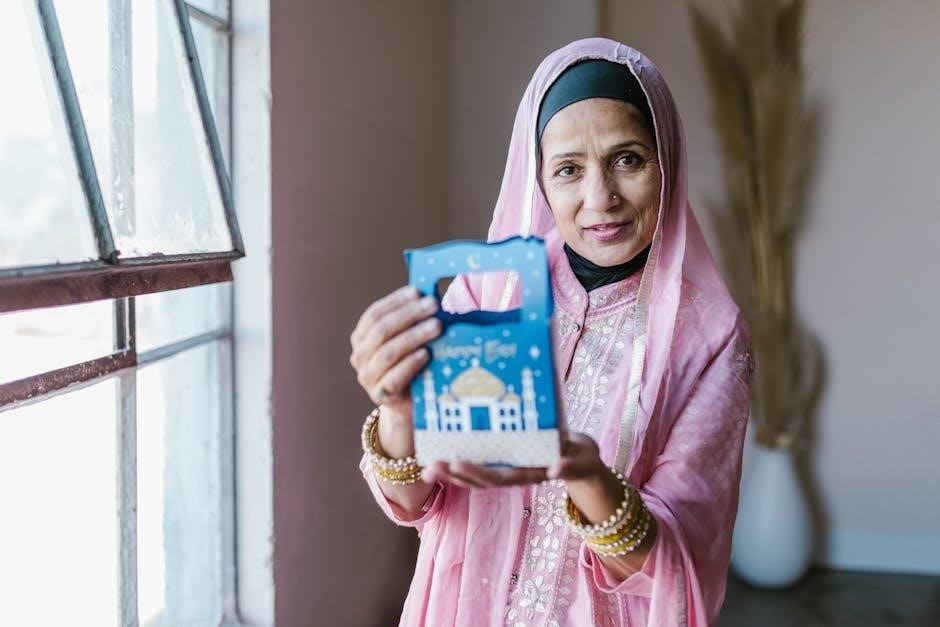Halal intimacy in Islam refers to permissible and ethical conduct within relationships‚ governed by Quranic principles and Prophetic traditions. It encompasses physical‚ emotional‚ and spiritual dimensions‚ ensuring mutual respect and dignity.
1.1. Definition of Halal and Its Significance in Islamic Teachings
Halal‚ meaning “permissible” in Arabic‚ is a central concept in Islam‚ defining actions‚ behaviors‚ and practices allowed under Islamic law. It ensures adherence to moral and ethical standards‚ promoting a righteous lifestyle that honors Allah’s will‚ as outlined in the Quran and Sunnah.
1.2. The Concept of Intimacy in Islamic Culture
Intimacy in Islamic culture is viewed as a sacred and private aspect of marriage‚ fostering emotional and spiritual connection. It is governed by modesty‚ respect‚ and mutual consent‚ emphasizing trust and affection. This bond is considered a form of worship when conducted within halal boundaries‚ reflecting divine teachings and promoting a fulfilling relationship.
1.3. The Importance of Halal Intimacy in Maintaining a Healthy Relationship
Halal intimacy strengthens relationships by fostering trust‚ respect‚ and emotional closeness. It ensures physical and spiritual purity‚ aligning with Islamic values. This sacred bond promotes harmony‚ mutual satisfaction‚ and a deeper connection‚ essential for a stable and fulfilling marital life rooted in faith and divine guidance.

Islamic Guidelines for Halal Intimacy
Islamic guidelines emphasize permissible intimacy within marriage‚ governed by mutual consent‚ respect‚ and adherence to Quranic teachings‚ ensuring a sacred and ethical relationship.
2.1. The Islamic Framework for Permissible Intimacy
The Islamic framework for permissible intimacy is rooted in the Quran and Sunnah‚ emphasizing marriage as the sole context for lawful relations. It stresses mutual consent‚ emotional connection‚ and modesty‚ ensuring intimacy aligns with divine directives and fosters a harmonious‚ respectful relationship.
2.2. The Role of Marriage in Halal Intimacy
Marriage is the cornerstone of halal intimacy in Islam‚ providing a sacred and lawful context for emotional and physical connection. It ensures commitment‚ trust‚ and mutual rights‚ fostering a stable and blessed relationship as ordained by Allah‚ with guidelines to protect dignity and promote harmony.
2.3. Prohibited Acts and Boundaries in Intimacy
Islamic teachings clearly define prohibited acts in intimacy‚ including premarital relations‚ adultery‚ and any form of sexual misconduct; Boundaries are established to protect individuals’ dignity and uphold moral integrity‚ ensuring all interactions align with divine laws and foster a righteous‚ respectful‚ and spiritually pure relationship.

Emotional and Spiritual Aspects of Halal Intimacy
Halal intimacy fosters emotional bonding‚ trust‚ and mutual respect‚ aligning with Islamic values. It strengthens spiritual connection‚ promoting a deeper understanding of divine love and marital harmony.
3.1. Building Emotional Connection Within Halal Boundaries
Halal intimacy emphasizes fostering emotional bonds through trust‚ respect‚ and mutual understanding. It encourages open communication and empathy‚ creating a foundation of love and harmony within Islamic guidelines‚ ensuring a balanced and fulfilling relationship.
3.2. The Role of Trust and Respect in Intimacy
Trust and respect are cornerstones of halal intimacy‚ fostering a sacred bond between partners. Islamic teachings emphasize honoring each other’s boundaries and emotions‚ ensuring intimacy is a mutual expression of love and commitment within permissible frameworks.
3.3. Spiritual Growth Through Halal Intimacy
Halal intimacy fosters spiritual growth by aligning actions with divine guidance‚ strengthening the connection between partners and Allah. It encourages mindfulness‚ gratitude‚ and self-refinement‚ transforming intimacy into a means of seeking closeness to God and nurturing a righteous‚ harmonious relationship.
Maintaining Modesty and Dignity in Intimacy
Maintaining modesty and dignity in intimacy involves respecting boundaries‚ adhering to Islamic ethics‚ and ensuring interactions remain pure and respectful‚ reflecting the teachings of Islam.
4.1. The Importance of Modesty in Islamic Teachings
Modesty is a cornerstone of Islamic teachings‚ emphasizing humility and moral conduct. It ensures that interactions‚ including intimacy‚ are conducted with respect‚ dignity‚ and adherence to divine guidelines‚ fostering a pure and ethical relationship.
4.2. Public vs. Private Conduct in Intimacy
In Islam‚ public conduct must uphold modesty and dignity‚ while private intimacy between spouses is sacred and protected. Public displays of affection are discouraged‚ ensuring confidentiality and respect for personal boundaries‚ as outlined in Islamic teachings.
4.3. Dress Code and Behavior Guidelines
Islamic teachings emphasize modesty in dress and behavior‚ requiring both partners to maintain dignity and respect. Dress codes should conceal private parts‚ while behavior must align with Islamic values‚ fostering trust and intimacy within permissible boundaries‚ as guided by the Quran and Sunnah.
Addressing Misconceptions About Halal Intimacy
Halal intimacy is often misunderstood as overly restrictive‚ but it emphasizes balance‚ respect‚ and spirituality. It is not about suppression but fostering healthy‚ ethical relationships within divine guidelines.
5.1. Common Misconceptions About Halal Intimacy
A prevalent misconception is that halal intimacy restricts emotional and physical connection. In reality‚ it promotes a balanced‚ respectful‚ and ethical approach‚ ensuring harmony between physical and spiritual aspects of relationships‚ fostering trust and mutual understanding within the framework of Islamic teachings.
5.2. Clarifying Cultural vs. Religious Practices
Cultural practices often influence perceptions of halal intimacy‚ but it’s essential to distinguish them from religious teachings. Islamic principles‚ as outlined in the Quran and Sunnah‚ provide clear guidelines that prioritize mutual respect‚ consent‚ and modesty‚ ensuring a balanced approach that aligns with divine norms and fosters a healthy relationship.
5.3. The Balance Between Halal and Haram in Intimacy
Halal and Haram define the boundaries of permissible and forbidden acts in Islam. Maintaining this balance ensures intimacy aligns with divine teachings‚ fostering a morally upright and spiritually fulfilling relationship while avoiding actions deemed impermissible by Islamic law.

The Role of Halal Intimacy in Strengthening Marital Bonds
Halal intimacy fosters trust‚ respect‚ and emotional connection‚ strengthening marital bonds by aligning physical and spiritual union with Islamic teachings‚ promoting harmony and mutual fulfillment.
6.1. How Halal Intimacy Fosters a Deeper Connection
Halal intimacy strengthens marital bonds by promoting mutual respect‚ trust‚ and emotional closeness. It encourages open communication‚ fostering a deeper spiritual and physical connection‚ aligned with Islamic values‚ creating a harmonious and fulfilling relationship.
6.2. Communication and Intimacy in a Halal Context
Effective communication is vital in halal intimacy‚ fostering mutual respect and emotional expression; It ensures both partners feel valued‚ promoting a deeper understanding and connection while adhering to Islamic guidelines‚ ultimately strengthening the relationship.
6.3. The Impact of Halal Intimacy on Family Life
Halal intimacy fosters a stable and harmonious family environment‚ promoting emotional and spiritual well-being. It strengthens bonds‚ encourages mutual respect‚ and creates a nurturing atmosphere for children‚ ensuring a balanced and righteous upbringing rooted in Islamic values.

Physical and Emotional Needs in Halal Intimacy
Halal intimacy addresses both physical and emotional needs‚ ensuring health and well-being. It fosters trust‚ respect‚ and emotional fulfillment within Islamic guidelines‚ promoting a balanced and satisfying relationship.
7.1. Understanding Physical Needs Within Halal Boundaries
Halal intimacy recognizes physical needs as natural‚ emphasizing their fulfillment within Islamic boundaries. These boundaries ensure respect‚ dignity‚ and spiritual alignment. Mutual consent and emotional connection are vital‚ fostering a healthy relationship. Adhering to these guidelines ensures a fulfilling and ethical intimate life‚ preventing harm and promoting overall well-being.
7.2. Emotional Fulfillment in a Halal Relationship
Emotional fulfillment in a halal relationship is rooted in trust‚ respect‚ and companionship. Islam emphasizes the importance of emotional bonds‚ encouraging partners to nurture affection and understanding. This foundation strengthens intimacy‚ fostering a serene and spiritually enriching connection‚ essential for a lasting and harmonious relationship.
7.3. Balancing Physical and Emotional Intimacy
In a halal relationship‚ balancing physical and emotional intimacy requires harmony and mutual respect. Islam teaches that both aspects must align with divine guidelines‚ fostering a connection that enriches the soul and strengthens the bond between partners‚ creating a fulfilling and spiritually satisfying relationship.

The Spiritual Dimensions of Halal Intimacy
Halal intimacy in Islam is deeply rooted in spirituality‚ fostering a sacred connection between partners that aligns with divine teachings‚ promoting a meaningful and fulfilling relationship.
8.1. The Spiritual Significance of Intimacy in Islam
Intimacy in Islam holds profound spiritual significance‚ reflecting divine love and connection. It is a sacred act that strengthens marital bonds and fosters a deeper relationship with Allah‚ emphasizing mindfulness of intentions and actions to seek blessings and harmony in a righteous manner.
8.2. The Role of Prayer and Supplication in Intimacy
Prayer and supplication are vital in Islam‚ fostering a sacred and blessed intimate relationship. Muslims are encouraged to invoke divine blessings before and after intimacy‚ ensuring the act is performed with gratitude‚ respect‚ and spiritual mindfulness‚ aligning it with Islamic values and enhancing emotional and spiritual connection.
8.3. Seeking Blessings Through Halal Intimacy
Halal intimacy is a means to seek divine blessings and strengthen marital bonds. Engaging in intimacy with the right intention and adherence to Islamic guidelines fosters a deeper spiritual connection‚ promoting emotional fulfillment and long-term relational harmony while aligning with Islamic values and ethical standards.

The Role of Education and Awareness in Halal Intimacy
Education and awareness about Halal intimacy are crucial for guiding individuals in understanding Islamic teachings‚ promoting healthy relationships‚ and maintaining spiritual and physical well-being through proper knowledge and ethical practices.
9.1. The Importance of Islamic Education on Intimacy
Islamic education provides a moral framework for intimacy‚ emphasizing permissible acts within marriage. It guides individuals to uphold dignity‚ respect‚ and spiritual growth‚ ensuring relationships align with divine teachings and foster a balanced‚ healthy approach to physical and emotional connection‚ rooted in faith and mutual understanding.
9.2. Promoting Awareness About Halal Intimacy
Promoting awareness about halal intimacy involves educating communities on Islamic principles governing relationships. Through workshops‚ literature‚ and community programs‚ individuals learn to distinguish between permissible and prohibited acts‚ fostering a culture of modesty and respect‚ and encouraging healthy‚ faith-aligned relationships within society.
9.3. The Role of Community and Leadership in Guiding Halal Intimacy
Community leaders and Islamic scholars play a vital role in guiding halal intimacy by providing religious guidance and fostering awareness. Mosques‚ Islamic councils‚ and community programs serve as platforms for education‚ ensuring individuals adhere to Islamic teachings and maintain moral standards in their relationships‚ promoting a collective commitment to halal practices.

Challenges and Solutions in Maintaining Halal Intimacy
Современные вызовы‚ такие как влияние общества и недоразумения‚ преодолеваются через соблюдение исламских принципов‚ обращение за руководством к ученым и открытую коммуникацию в отношениях для поддержания халяльных стандартов.
10.1. Common Challenges in Modern Society
Modern society presents challenges like societal pressures‚ misconceptions about halal intimacy‚ and cultural influences conflicting with Islamic teachings. Additionally‚ lack of education and awareness about Islamic guidelines can lead to misunderstandings and misapplication of halal principles in relationships.
- Societal influences contradicting Islamic values.
- Misconceptions about halal intimacy practices.
- Cultural practices conflicting with Islamic teachings.
- Lack of education on Islamic guidelines.
- External pressures on relationship dynamics.
10.2. Practical Solutions for Maintaining Halal Intimacy
Practical solutions include seeking Islamic education‚ fostering open communication‚ and cultivating mutual respect. Couples can strengthen their relationship through regular prayer‚ supplication‚ and adhering to Islamic guidelines. Community support and counseling from knowledgeable scholars also play a vital role in navigating challenges.
- Seek Islamic education and guidance.
- Practice open and respectful communication.
- Engage in regular prayer and supplication.
- Adhere to Islamic ethical boundaries.
- Seek counseling from scholars or mentors.
10.3. The Role of Faith and Commitment in Overcoming Challenges
Faith and commitment serve as the foundation for overcoming challenges in maintaining halal intimacy. Trust in Allah‚ adherence to Islamic teachings‚ and mutual dedication strengthen relationships. Couples who prioritize their spiritual bond and seek divine guidance are better equipped to navigate difficulties while upholding halal principles.
- Trust in Allah’s wisdom and guidance.
- Commitment to Islamic values and teachings.
- Mutual dedication to spiritual and emotional growth;
- Seeking divine blessings and forgiveness.

The Impact of Halal Intimacy on Personal and Social Well-being
Halal intimacy fosters emotional stability‚ strengthens relationships‚ and promotes societal harmony. It aligns with divine teachings‚ enhancing personal fulfillment and contributing to a morally upright community.
11.1. The Positive Effects of Halal Intimacy on Mental Health
Halal intimacy fosters mental well-being by reducing guilt and anxiety‚ promoting trust and mutual respect. It aligns with Islamic teachings‚ encouraging emotional stability‚ contentment‚ and a sense of fulfillment‚ leading to a healthier and more balanced mental state.
11.2. The Role of Halal Intimacy in Building a Harmonious Society
Halal intimacy promotes societal harmony by fostering respect‚ trust‚ and moral integrity. It strengthens family bonds‚ reduces conflict‚ and encourages responsible behavior‚ contributing to a stable and ethical community that values mutual respect and adherence to divine principles.
11.3. The Long-term Benefits of Adhering to Halal Intimacy
Adhering to halal intimacy fosters long-term relational stability‚ emotional well-being‚ and spiritual growth. It promotes mutual respect‚ trust‚ and a clear conscience‚ leading to stronger familial bonds and a balanced‚ righteous lifestyle that aligns with Islamic teachings and values.
Halal intimacy in Islam balances physical and spiritual connection‚ fostering mutual respect and harmony. It aligns with Islamic teachings‚ promoting a healthy‚ righteous relationship and spiritual growth.
12.1. Summarizing the Key Points of Halal Intimacy
Halal intimacy is rooted in Islamic principles‚ emphasizing permissible acts within marriage‚ mutual respect‚ and trust. It balances physical and emotional connection‚ fostering spiritual growth while adhering to modesty and dignity‚ ensuring a healthy and righteous relationship according to Islamic values and teachings.
12.2. The Universal Application of Halal Intimacy Principles
Halal intimacy principles transcend cultural boundaries‚ promoting ethical and respectful relationships globally. Their universal appeal lies in fostering trust‚ communication‚ and emotional connection‚ applicable to all seeking a moral and fulfilling partnership‚ regardless of faith or background‚ emphasizing mutual respect and spiritual harmony in intimacy.
12.3. Encouraging a Balanced and Healthy Approach to Intimacy
A balanced approach to intimacy involves nurturing both physical and emotional needs within halal boundaries. This fosters a healthy relationship‚ promoting mutual respect‚ trust‚ and spiritual growth. By adhering to Islamic teachings‚ couples can achieve a harmonious and fulfilling connection that honors their faith and strengthens their bond.